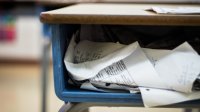Helping Students With ADHD Stay Organized
Digital portals like Google Classroom and Moodle can benefit students who struggle with organization and executive function.
Students with attention-deficit/hyperactivity disorder often have difficulty keeping their things organized. Have you ever looked inside the backpack or desk of a student with ADHD? It may have looked like a hurricane had torn right through it.
That doesn’t happen because such students are lazy or careless—students with attention challenges are typically not geared for this type of organization, and many of them also have concurrent learning and developmental disabilities like dyslexia, spectrum disorders, fine motor delays, or sensory integration issues that may add to the struggle.
Try to imagine the stress felt by a student who has executive function deficits and graphomotor issues at the end of every school day when he has to scrawl down his homework while making sure he has all of the papers he needs in his overfull, messy backpack.
What can we do to support students like this without having to constantly micromanage their organization?
I found a possible answer to this question by looking at my own behavior. My desk used to be covered in papers. I kept multiple calendars in multiple places. I had Post-its scattered around the room like clues to a mystery. Moving to a fully digital organization routine changed all that: Now I organize my schedules, bills, and calendars online, and I have access to it all on my laptop and my phone.
An online classroom, or learning management system (LMS), is an app teachers can use to upload and present all the information students need: documents, grades, the assignment calendar, etc. These portals—Google Classroom, Hapara, Canvas, and Moodle, to name a few—are, in my observation, highly effective systems with many benefits for students who struggle with classroom organization.
4 Uses of an LMS for Students Who Struggle With Organization
1. Tracking assignments and calendars: Teachers can create calendars or charts in their LMS showing the upcoming schedule for projects and readings, which allows students to see clearly what assignments are left to complete and when they’re due. Some systems even generate an “upcoming assignments” scroll right on the home page.
I’m now an educational therapist, and in this role I used to have to spend the first 10 minutes of my sessions with students digging through their backpacks and binders like we were archaeologists searching for fossils, trying to decipher what exactly they had for homework. Now, my students whose schools use an LMS do this independently, and it takes all of a minute for them to tell me exactly what they have to work on.
2. Following teacher feedback: For years, I’ve watched my students struggle to read teachers’ handwritten comments crammed into the margins of essays on lined paper. With an LMS, students can submit a typed document and receive direct feedback from their teachers in comments typed on the side of the doc.
The comments are tied to specific phrases in the students’ text, so it’s easy to see exactly what the teacher is referring to. Students can easily access them, and better yet, they can then respond to the teacher’s comment, creating a dialogue or conversation that the student can refer back to later.
A high school student of mine once received a suggestion from a teacher about a possible adjustment to his essay, and when he wrote back that he didn’t quite understand the advice, the teacher quickly clarified the point. This was a simple but very effective way for the student and teacher to engage with each other.
3. Editing and rewriting: In the past, after receiving the dreaded red-pen comments on their essays, students would have to scrawl out corrections on the messy draft and then write a whole new draft on a separate piece of paper to incorporate the teacher’s feedback and their own responses.
Do any of us adults do this anymore in our own work? Of course not—we edit our emails, documents, or presentations right in the draft and rewrite as we go. (And aren’t the trees grateful?) Students with struggle with writing production, expressive language, and attention issues should have an easier time with this kind of work if we can get them up and running on the computer, using formats like Word, Google Docs, and PowerPoint.
4. Writing practice using real-world scenarios: Using an LMS gives students extra opportunities to develop practical writing skills. One of my sixth grade students is on the spectrum and struggles with expressing himself verbally and in writing; he also struggles with pragmatic social language, so his sentences are often short and lacking in detail. In the course of using his school’s LMS (PowerSchool), he has learned to write emails to his teachers when he’s confused about an assignment. To ensure that a teacher understands his question, he is careful to write clear sentences that express fully what he’s trying to convey, so he’s developing really useful communication skills.
We now live in a digital world. Thankfully for our students with ADHD and learning challenges, the online portals now available not only help scaffold the organization process but also help them become more independent and confident in their ability to track assignments, hand them in on time, and interact with their teachers in the digital space. And isn’t this how we adults now take care of business?
